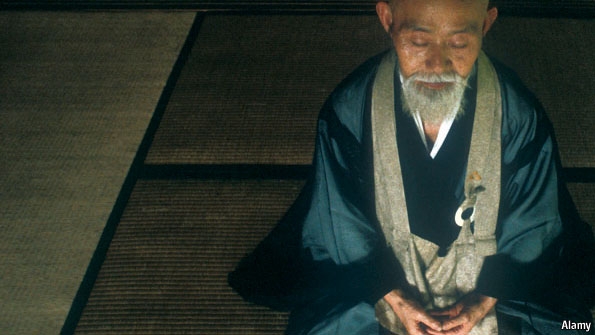Americans get wiser with age. Japanese are wise from the start
Apr 7th 2012
ONE stereotype of wisdom is a wizened Zen-master smiling benevolently at the antics of his pupils, while referring to them as little grasshoppers or some such affectation, safe in the knowledge that one day they, too, will have been set on the path that leads to wizened masterhood. But is it true that age brings wisdom? A study two years ago in North America, by Igor Grossmann of the University of Waterloo, in Canada, suggested that it is. In as much as it is possible to quantify wisdom, Dr Grossmann found that elderly Americans had more of it than youngsters. He has, however, now extended his investigation to Asia—the land of the wizened Zen-master—and, in particular, to Japan. There, he found, in contrast to the West, that the grasshoppers are their masters’ equals almost from the beginning.
Dr Grossmann’s study, just published in Psychological Science, recruited 186 Japanese from various walks of life and compared them with 225 Americans. Participants were asked to read a series of pretend newspaper articles. Half described conflict between groups, such as a debate between residents of an impoverished Pacific island over whether to allow foreign oil companies to operate there following the discovery of petroleum. (Those in favour viewed it as an opportunity to get rich; those against feared the disruption of ancient ways and potential ecological damage.) The other half took the form of advice columns that dealt with conflicts between individuals: siblings, friends and spouses. After reading each article, participants were asked “What do you think will happen after that?” and “Why do you think it will happen this way?” Their responses were recorded and transcribed.
Dr Grossmann and his colleagues removed age-related information from the transcripts, and also any clues to participants’ nationalities, and then passed the edited versions to a group of assessors. These assessors were trained to rate transcribed responses consistently, and had been tested to show that their ratings were statistically comparable with one another.
The assessors scored participants’ responses on a scale of one to three. This attempted to capture the degree to which they discussed what psychologists consider five crucial aspects of wise reasoning: willingness to seek opportunities to resolve conflict; willingness to search for compromise; recognition of the limits of personal knowledge; awareness that more than one perspective on a problem can exist; and appreciation of the fact that things may get worse before they get better.
A score of one on any aspect indicated a participant gave no consideration to it. A score of two indicated some consideration. A score of three indicated a great deal of consideration. Each participant’s scores were then added up and mathematically transformed to create an overall value within a range of zero to 100 for both interpersonal and intergroup wisdom.
The upshot was that, as Dr Grossmann had found before, Americans do get wiser with age. Their intergroup wisdom score averaged 45 at the age of 25 and 55 at 75. Their interpersonal score similarly climbed from 46 to 50. Japanese scores, by contrast, hardly varied with age. Both 25-year-olds and 75-year-olds had an average intergroup wisdom of 51. For interpersonal wisdom, it was 53 and 52.
Taken at face value, these results suggest Japanese learn wisdom faster than Americans. One up, then, to the wizened Zen-masters. But they also suggest a paradox. Generally, America is seen as an individualistic society, whereas Japan is quite collectivist. Yet Japanese have higher scores than Americans for the sort of interpersonal wisdom you might think would be useful in an individualistic society. Americans, by contrast—at least in the maturity of old age—have more intergroup wisdom than the purportedly collectivist Japanese. Perhaps, then, you need individual skills when society is collective, and social ones when it is individualistic. All of which goes to show that the real root of wisdom is this: do not assume, little grasshopper, that your prejudices are correct.
Copyright © The Economist Newspaper Limited 2012. All rights reserved.
See online: Age and wisdom: Older and wiser?

